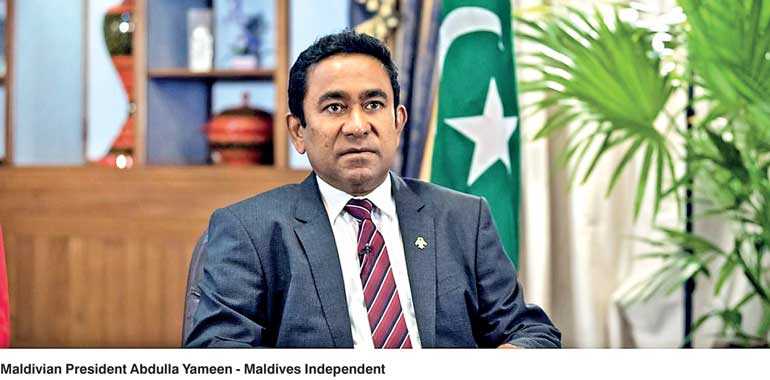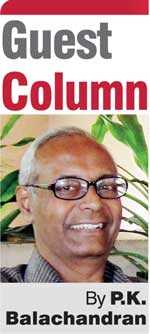Monday Feb 23, 2026
Monday Feb 23, 2026
Saturday, 13 October 2018 00:10 - - {{hitsCtrl.values.hits}}

It is said that politics is the art of the possible. In other words, politics is about what is possible and opportune, and not necessarily what is best or morally right. Maldivian politics and institutional functioning exemplify this, with opportunism getting the better of other considerations.
And the rampant opportunism one sees in the Maldives makes prediction of political and institutional behaviour very difficult.
President Abdulla Yameen was defeated by the Joint Opposition candidate Ibrahim Mohamed Solih by a margin of over 38,000 votes in the 23 September Presidential election. There were hardly any complaints while the polling and counting were on. International election observers (and subsequently the international community) hailed the process as having been free and fair.
On top of all that, President Yameen, who allegedly did all he could to ‘steal the election’, acknowledged that the result was the ‘peoples’ will’ and said that he would quit office on the due date – 17 November.
The process of transiting from the Presidency of Yameen to the Presidency of Solih got underway in right earnest with the appointment of Ahmed Latheef as Director General of Transition. President-elect Solih began visiting various ministries and departments discussing issues and he encountered no hostility anywhere.
But for reasons not yet clear, Yameen suddenly changed course and challenged the margin of defeat, which he thought was unbelievable. He charged that there was rigging. He demanded an explanation from the Elections Commission (EC), though it had been hand-picked by him and was headed by Ahmed Shareef, a former Secretary General of Yameen’s Progressive Party of the Maldives (PPM).
The PPM then stepped up the attack on the EC and Shareef by saying that hard evidence about rigging in favour of the opposition candidate had surfaced. It also said that there were numerous complaints from party cadres about the election.
It charged that the EC had rigged the poll in return for a huge amount of money deposited in a bank account. It cited an audio with a tell-tale conversation between Shareef and an unnamed individual.
The PPM further said that Shareef had used an ingenious method to invalidate votes cast in favour of its candidate, President Yameen.
The PPM also hinted that Yameen might go to the High Court and the Supreme Court challenging the electoral process. As the opposition leader Mohamed Nasheed said, Yameen was clearly on a mission to get the result of the 23 September election annulled. It was no longer the margin of defeat, but the election result itself that was being questioned.
On 10 October, the PPM submitted a ‘constitutional case’ to the Supreme Court, with ‘numerous complaints from party supporters’. The case was lodged by the President’s appointee in the judicial watchdog, the Judicial Services Commission.
Commenting on this, President elect Solih’s Maldivian Democratic Party said: “This affirmed alarming concerns about the lack of independence of the judiciary, and the judicial watchdog.”
“And this when the Elections Commission had dismissed all accusations of wrong-doing, and pointed to the fact that there had been no complaints filed with the EC, that could challenge the outcome of the results,” MDP’s spokesman Hamid Abdul Ghafoor said in a statement.
“The ruling party had not lodged a single complaint or raised a single issue, until a week after the votes were counted,” Ghafoor pointed out.
“Yameen’s efforts to nullify the election through the Supreme Court is reminiscent of his coming to power in 2013. Yameen had come to power after the Supreme Court nullified two rounds of voting which had shown a clear lead for the then opposition candidate, Mohamed Nasheed,” Ghafoor added.
“The Joint Opposition calls on state institutions, including the Supreme Court, and the security forces to uphold the will of the people, and to ensure the lawful mandate handed to President- elect, Ibrahim M. Solih is not thwarted by the egregious manoeuvrings of the defeated candidate,” Ghafoor said.
The Supreme Court has taken up the election case and has asked the EC to make its submission on Saturday. The court is expected to take up the case on Sunday.
Meanwhile, threats were made to the Elections Commissioners, forcing four out of the five commissioners to flee to Sri Lanka. Fear of arrest and reprisal mounted after Yameen replaced the police chief after the latter said that the police would abide by the law and constitution.
On their part, the Elections Commissioners completely denied Yameen’s charges and pointed out the number of invalid votes was only 3132, the validation of which would not change the result anyway. The EC also complained to the police about a PPM MP’s remark that the EC is a group of ‘thieves’ who had ‘stolen the election’.
 Elections Commission
Elections Commission
As if Yameen’s flip flop was not enough, the EC too kept changing its stand in regard to the disqualification of 12 MPs under an ‘anti-defection ruling’ by the Supreme Court on 13 July 2017.
The 12 MPs of the ruling PPM had rebelled against Yameen and were going to vote for a No-Confidence Motion against parliament Speaker Abdulla Maseeh Mohamed in August 2017. Yameen wanted to thwart this move by preventing the 12 MPs from joining the opposition, swelling its ranks and making his government lose its majority. He wanted to reduce the membership of the House by sacking them.
The EC disqualified the 12 MPs citing the Supreme Court ruling of 13 July 2017 which had said that any one switching political parties or is sacked by his or her party would lose his or her parliamentary seat. The EC disqualified them by making the Supreme Court ruling applicable retrospectively.
But the MPs filed individual cases in the Supreme Court against their disqualification. As the Yameen-friendly Supreme Court kept their cases pending, the affected MPs would regularly attempt to attend parliament only to be thrown out by police and army troops.
EC changes stand
However, after the 23 September election, the EC changed its stand on the MPs. It said that the MPs had been wronged by Yameen and re-instated them.
But the Supreme Court stepped in and said that the EC had no right to do that because, under the constitution, election-related disputes can be settled only by the Supreme Court.
And at any rate, the matter is sub judice with the individual MPs’ cases pending in court, the apex court pointed out.
The court started hearing the individual cases and reinstated four of the 12 MPs. The cases of the remaining eight are still to be heard.
But suddenly, the EC changed its stand and its counsel told the court that the MPs cannot be reinstated because they cannot be deemed to have quit their party, PPM, before they are struck off the rolls (called Registry).
The EC pointed out that the MPs were removed from their Registry only after the Supreme Court ruling of 13 July 2017. Therefore, they stand disqualified.
As to what the Supreme Court would do remains to be seen because it had earlier reinstated four MPs on the ground that they had resigned from the PPM before the 13 July 2017 court ruling on disqualification.
Two important cases are now before the Supreme Court: One is the validity of the results of the 23 September Presidential election and the other is the disqualification of the 12 MPs.
The case of the 12 MPs underlines the need for a well-thought out anti-defection law because the existing law had been ‘passed’ in the absence of the required presence in parliament. More than half the 85-member House must be present for voting on ‘any matter requiring compliance by citizens’. But only 39 MPs attended the sitting which passed the anti-defection bill in March 2018.